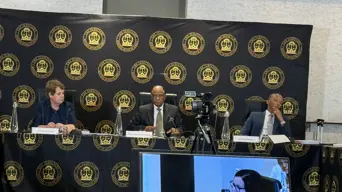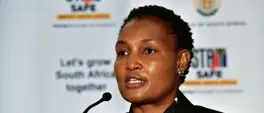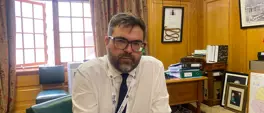CHRIS OXTOBY & JUDITH FEBRUARY | Ethics in the law – should we be concerned?
Judith February
6 November 2025 | 12:45The wave of recent negative publicity for the legal profession is concerning because it takes place against a backdrop where public trust and confidence in the rule of law and institutions that uphold it are precarious, writes Judith February.
- Judicial Service Commission (JSC)
- Judiciary
- Legal Practice Council (LPC)
- Democracy
- Selby Mbenenge
- Madlanga Commission of Inquiry
- KZN police commissioner Nhlanhla Mkhwanazi
- Katiso ‘KT’ Molefe

FILE: The Judicial Conduct Tribunal hearing for Eastern Cape Judge President Selby Mbenenge resumed on 21 October 2025. Picture: Kgomotso Modise/EWN
The past few weeks have not presented a good image of the judiciary or the legal profession.
A witness at the Madlanga Commission of Inquiry into Criminality, Political Interference and Corruption in the Criminal Justice System alleged that the current Acting Judge President of the Gauteng High Court, Aubrey Ledwaba, was paid a bribe to grant bail to Katiso "KT" Molefe.
Molefe is facing five charges of murder, and was named by Lieutenant-General Nhlanhla Mkhwanazi as one of the alleged underground figures involved in the capture of the criminal justice system. (It must be noted that Judge Ledwaba has denied the allegations, and there does not appear to be any evidence in the public domain at present to substantiate the allegation.)
The October sitting of the Judicial Service Commission (JSC) saw at least three instances of candidates, who lest we forget, were being interviewed for appointment as judges, having questions about their ethics raised.
One candidate was taken to task for failing to disclose that he had previously been suspended from practisingas a lawyer. Another did disclose a suspension, but withdrew his candidacy during his interview after commissioners criticised him for appearing to downplay the severity of the issue. And a third candidate struggled to deal with what ought to have been straightforward questions about his nomination forms.
It is to the credit of the JSC that it did not recommend any of these candidates for appointment. But the very appearance of practitioners with such question marks over their professional ethics is in itself concerning, if not completely surprising.
Hardly a week goes by without media reports of misconduct or other ethical issues affecting legal practitioners, and the Legal Practice Council (LPC) appears to be struggling to hold delinquent practitioners to account.
This wave of negative publicity for the legal profession is especially concerning because it takes place against a backdrop where public trust and confidence in the rule of law and nstitutions that uphold it are precarious.
A recent Afrobarometer survey reported "deep frustration" with South Africa’s democratic system. Most strikingly, 49% of respondents expressed support for military rule, a 21% increase since the previous survey round in 2022.
What basis there is to imagine that this would improve any of the underlying concerns with the country’s governance systems is unclear, but that is a discussion for another time. What it does demonstrate quite clearly is that we have to be concerned about how our democratic institutions are functioning.
Recent research findings by the World Justice Project (WJP) suggest that these sentiments are consistent with a global pattern. The WJP finds an accelerating global decline in the rule of law, as authoritarianism rises in civil society space shrinks.
Law is at the centre of South Africa’s constitutional democracy. Our system grants our courts widespread powers to mediate disputes and to overturn decisions by democratically elected branches of government.
This is not in itself a bad idea, but it does mean that if our judges and lawyers are seen to fall short of core ethical and professional standards, public trust in the entire system of government will likely be affected. It is therefore critical that serious consideration be given to addressing the type of issues we describe above.
There are several interventions that can help. The process of holding judges accountable has long been criticised, and reforms to ensure that the process works more quickly and transparently will surely help to demonstrate that judges themselves are properly accountable. The outcome of the ongoing judicial conduct tribunal involving Eastern Cape Judge President Selby Mbenenge will be a good litmus test.
The process of appointing judges can also be improved. Whilst it is true that the JSC did not appoint the problematic candidates discussed above, there are ongoing concerns about the process by which candidates are shortlisted.
It cannot help public confidence in the justice system when people see candidates even be interviewedfor judicial appointment despite serious concerns and shortcomings relating to their fitness for judicial office.
A reform and strengthening of the JSC’s shortlisting procedures would help to improve public confidence in the judiciary. The process the JSC employs to select candidates can also be improved, as demonstrated by the JSC’s failure to appoint from several competent candidates for a vacancy on the Supreme Court of Appeal. This issue is the subject of ongoing litigation brought by Freedom Under Law.
Finally, the regulation of the legal profession has been a longstanding concern, with the LPC coming under intense scrutiny for how it has dealt with misconduct complaints against legal practitioners.
If the LPC can improve its handling of complaints and ensure that the public is better protected from compromised legal practitioners, this will surely make a significant difference to the public perception of our justice system, and indeed the systemsof government more generally. The stakes are high. Let organisations like the judiciary, the JSC and the LPC now lead the way in making meaningful changes.
Get the whole picture 💡
Take a look at the topic timeline for all related articles.
Trending News
More in Opinion

11 February 2026 14:44
CHARLES MATSEKE | From State capture to state inheritance: How South Africa’s 'new dawn' became an oligarchic dusk

6 February 2026 15:37
JAMIL F. KHAN | 2026 and the reckoning we delayed: Colonial power, global injustice and the myth of neutrality

6 February 2026 08:16
CHARLES MATSEKE | The DA’s leadership crisis












